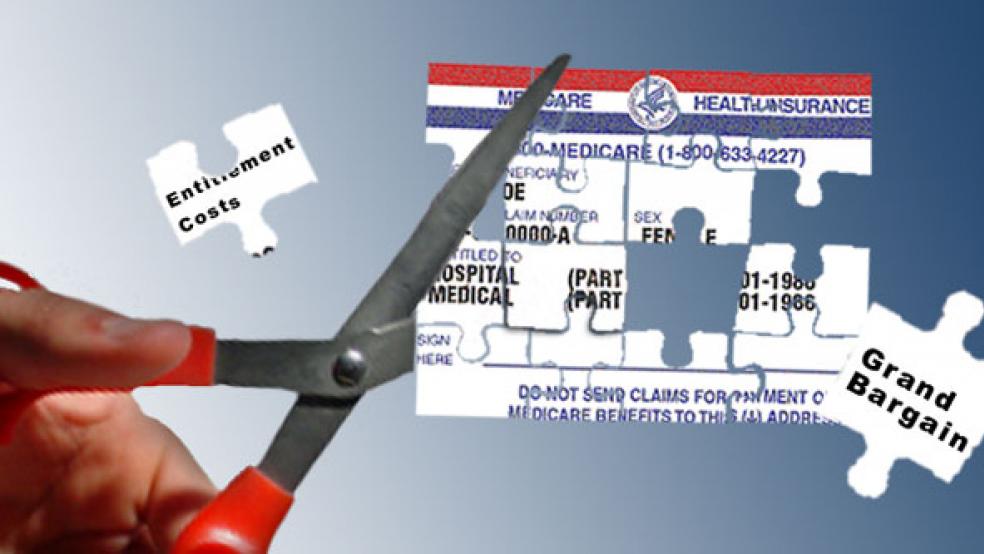Taxes may be taking the lion’s share of the spotlight right now in the fervor to negotiate a fiscal cliff deal, but Medicare looks more and more like the major obstacle to putting the federal budget on a stable course.
As part of the talks to avoid the year-end cliff, President Obama and House Speaker John Boehner – challenging a core Republican belief – have agreed to some form of a tax rate hike on wealthy Americans. Obama prefers higher rates on incomes above $400,000 as part of a grand bargain, while Boehner, in both his counter offer and the alternative Plan B, wants a starting point of $1 million.
RELATED: White House Slams ‘Plan B’ As a Sop to the Rich
Structural changes to Medicare – the spending bomb set to detonate as the grand bargain's 10-year window closes – have mostly been offstage in this D.C. drama. Boehner has proposed gradually raising the Medicare eligibility age from 65 to 67, a change Obama has resisted while calling for savings on prescription drugs. Any agreement will also suspend or permanently repeal what’s known as the “doc fix,” the automatic payment cuts to Medicare physicians that Congress perpetually puts off.

“It’s the grand bargain version of kicking the can down the road,” Joseph Antos, a scholar at the conservative American Enterprise Institute, told The Fiscal Times on Wednesday. “That would be enough for January, but we’re making a mistake not to take this pressure and turn it into an excuse for policymakers to make some moves on Medicare.”
The Congressional Budget Office projected this summer that Medicare will grow from a 3.7 percent share of the entire U.S. economy this year to an unstable 6 percent by 2037, as the national debt approaches 200 percent of our gross domestic product.
Enrollment in the government insurance program will surge 60 percent in the next two decades to roughly 80 million Americans as the baby boomers retire. Health care costs routinely outstrip inflation, with expenses almost double the 2.1 percent rate of inflation so far this year, according to the Bureau of Labor Statistics.
IDEOLOGICAL SCHISM
The big-impact solution for the problem is at the heart of an ideological schism. Both sides recognize the need to pay for outcomes, rather than individual procedures. But Democrats largely support leveraging the financial heft of the government to control costs, while Republicans mostly prefer empowering the consumer sector.
"From what we see, the government does have that concentrated buying power and it needs to use that in purchasing prescription drugs and durable medical devices," said Joe Baker, president of the independent Medicare Rights Center. "We're spending too much for prescription drugs in Medicare.”
As part of Obama’s grand bargain proposal to trim the deficit by $4 trillion over the next decade, there would be $400 billion in health care savings, almost 36 percent of which would come from using stricter Medicaid standards to buy prescription drugs for low-income Medicare recipients.
It’s possible for the government to wring additional savings, but that requires an unwelcome fight with the pharmaceutical lobby. There’s also the expectation that Obamacare might bend the cost curve once with the start of programs designed to encourage best practices and the establishment in 2014 of government-subsidized health insurance exchanges that offer standardized plans.
“The way the exchanges are set up and subsidies are set up, there is a real pressure to keep costs as low as possible,” said Dr. Bruce Vladeck, a senior adviser to Nexera, Inc., who oversaw Medicare and Medicaid during the Clinton administration. “Every employer is going to have an option to maintain insurance or encourage employees to go the exchange.”
Republicans aren’t holding their breath on Obamacare. They favor transforming Medicare into some kind of subsidy to purchase private health insurance, along the lines of the “premium support” idea contained in the budget plan by Wisconsin Congressman Paul Ryan, who was also the GOP vice presidential nominee.
The concept of turning Medicare into more of a voucher-style program has been conspicuously absent from Boehner’s public remarks about the fiscal cliff. But the consequences of the status quo with Medicare spending are a major part of his sales pitch, with the speaker holding up a chart during an update on negotiations last week that shows federal expenditures reaching Himalayan heights in the decades to follow.
“Even if the tax issues are resolved, it is not clear whether there is much of an appetite to consider entitlement reform or other strategies key to deficit reduction,” lamented Gail Wilensky, an economist who oversaw Medicare for President George H.W. Bush, in a commentary this week for the Journal of the American Medical Association.
The major Republican proposal thus far on increasing the eligibility age has been criticized as a negative for the economy as a whole. It cuts federal spending by $5.7 billion in 2014, but imposes $11.4 billion in expenses on the private sector, according to an analysis by the Kaiser Family Foundation.
And just as Republicans are suspect of Obamacare, Democratic-affiliated experts doubt that consumers can reshape a market as opaque as health care, where it’s seldom clear exactly what you’re buying and how much it costs. Hence, the conundrum facing lawmakers in a split government.
"That's ridiculous that consumers can make those choices,” Vladeck told The Fiscal Times. “Consumers don't get to choose the prices of their drugs that their doctors prescribe. We have a great deal of data that says if you increase consumer liability, people of limited incomes make choices that are bad for their health and cost their insurer more money over time. It's a documented stupid position."




